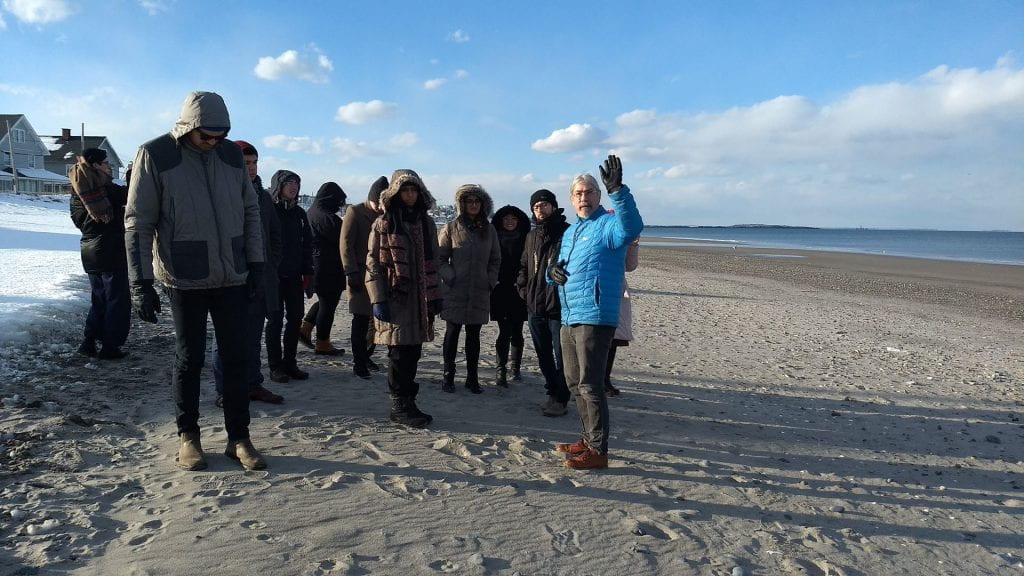
Coastal cities worldwide are grappling with the immediate and future effects of sea level rise due to climate change. A report by a multidisciplinary team of Cornell students helping Metro Boston’s planning council assess the tradeoffs of different climate adaptation strategies has been selected by the American Planning Association (APA) for its 2020 Student Project Award. In making the award, the APA especially recognized the project’s innovative approach to addressing a widespread societal challenge.
The students’ work is notable for its integration of local budgetary obligations, land-use planning, climate projections, and social and environmental well-being. Their findings underscore the need for regional cooperation to advance equitable and sustainable adaptation to long-term climate impacts.
The project, titled “Staying Afloat in 2100: Evaluating Fiscal and Land Use Options for Coastal Adaptation in Massachusetts,” was the focus of a spring 2019 Coastal Adaptation to Climate Change workshop taught by Assistant Professor Linda Shi in the Department of City and Regional Planning (CRP). Students in the undergraduate urban and regional studies major, master’s in regional planning degree program, and master’s in public administration program made up the winning team. Students from another CRP course, Land Use Planning Methods, taught by Associate Professor Jennifer Minner, served as consultants for the project, providing important analysis for the workshop class.
“I’m delighted the students have received the highest recognition by the profession for student project work,” said Shi. “This project demonstrates cutting-edge research and thinking in the field of coastal adaptation planning. I’m incredibly fortunate to have worked with such dedicated and passionate students, many of whom continued to work on the project after the semester to deliver a high-quality final report to the client.”
Through the workshop, students analyzed the fiscal impacts of climate change on three coastal Massachusetts towns south of Boston: Hull, Hingham, and Cohasset. Hull, a town on a narrow peninsula, is particularly vulnerable to the effects of climate change, with six feet of sea level rise – likely to take place by 2100 under current emissions trends – projected to chronically inundate over half of the town.

The students’ analysis included three adaptation scenarios: elevating houses and roads in Hull; retreating from flooded areas and building more densely inland; and relocating all Hull residents, restoring the peninsula as a sandbar, and adding it to the Boston Harbor Islands National and State Park. For each scenario, students created their own analytical methods and models to assess financial, social, and environmental tradeoffs.
Joshua Rotbert (M.R.P. ’20), one of the students in the workshop, felt empowered by the opportunity to create a tangible climate change response. “I believe our team has produced something of significant value, with real-world relevance and application toward fighting climate change, and being recognized for that has been extremely gratifying,” he said. “While I was able to develop my technical and analytical skills through the workshop, I was also pleased that the project team sought to preserve a focus on the humanity of residents caught on the frontlines of climate change.”
The Metropolitan Area Planning Council (MAPC), Boston’s regional land use agency, noted that the project’s fiscal analysis approach fills an analytical gap in planners’ efforts to address climate change, which more typically focus on the vulnerability of infrastructure systems. They plan to extend the project’s analysis to the 101 municipalities in the metro region. The report’s appendix provides a methodology that other regional and local agencies can replicate.
The student members of the APA 2020 Student Project Award winning team are:
- Erik Bucio (B.S. URS ’21)
- Naomi Crimm (M.R.P. ’20)
- Qihui Gao (CIPA M.P.A. ’19)
- Anushi Garg (M.R.P. ’20)
- Katharine Long (CIPA M.P.A. ’20)
- Margaret Ross-Martin (M.R.P. ’19)
- Joshua Rotbert (M.R.P. ’20)
- Sanjana Sidhra M.R.P. ’20
- Jacob Soley (B.S. URS ’20)
- Audrey Wachs (M.R.P. ’20)
- Sauvanithi Yupho (M.R.P. ’20)
- Ryan Thomas, PhD Student Research Advisor, and
- Khyati Rathore (M.R.P. ’19), Teaching Assistant
The project additionally benefitted from funding support from Engaged Cornell, the Institute for Social Science, and the Department of City and Regional Planning.